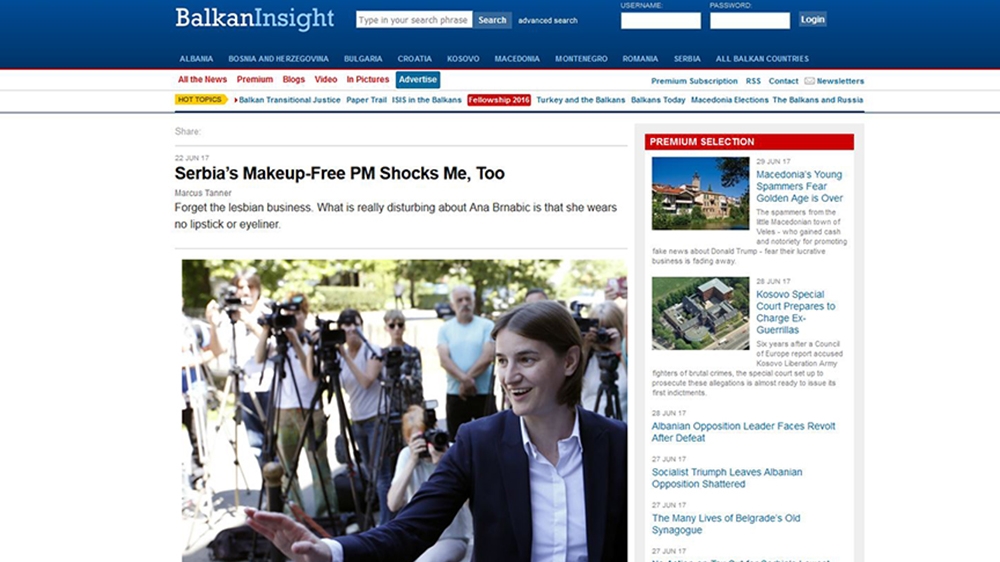On Make-Up, Serbian Women and a Lesbian PM
BALKANS AND EASTERN EUROPE, SEXUALITIES, 3 Jul 2017
Marija Pantelic and Lana Pasic – Al Jazeera
The misogynistic, neo-colonialist article published in Balkan Insight shocks us, too.

Serbia’s Prime Minister designate, Ana Brnabic, smiles during a parliament session in Belgrade. [Reuters/Marko Djurica]
29 Jun 2017 – In response to Serbia’s appointment of the first openly gay prime minister, last week Balkan Insight published an article by Marcus Tanner titled “Serbia’s Makeup-Free PM Shocks Me, Too”.
The presumably sarcastic article opens with the following profound observation: “I feel sorry for Serbian MPs. Yes, you heard it right. I do feel sorry for them. […] It is bad enough for them that she is a woman. It’s even worse that she apparently feels no physical attraction for that hairy mythical beast, the Serbian Male. It’s even worse, again – if it’s possible to get any worse – that she disobeys Serbian Woman’s Rule No 1 – she wears absolutely no makeup.”
Tanner, a British male journalist, qualifies himself to the readers as someone who lived in Serbia for seven years. White male privilege, of course, gives him the authority to comment on all things Balkan.
Tanner is also a symptom of a pervasive intellectual illness which many Westerners visiting, working and living in the Balkans suffer from. It is a form of misogynistic, neo-colonialism which is particularly contagious among white Western males.
The self-fulfilling prophecy of sensationalist Western journalism
The new prime minister, Ana Brnabic is mentioned in the title and the introduction, but the article is motly a rant about Tanner’s housemate and her make-up habits.
What is particularly troubling is that Tanner considers himself an authority on the lives of Serbian women. He feels entitled to judge what sort of behaviour and body image is appropriate for them in different situations, imposing an objectified picture of what he calls “the standard variety Serbian woman”.
According to Tanner, his housemate wore too much make-up for what she did: “she had a very modest sales job in some obscure corner of Belgrade”. In this vein, Tanner also talks about “a family of refugees from the Knin area”. When Tenner visited them with his housemate to bring cake, they were informed by the mother that her daughters were “in the bathroom – doing their makeup”. Tanner reports being “struck by how determinedly [Serbian women] maintained standards […] even in the most extreme situations.”
We are tempted to ask ourselves: Would Tanner dare write a similar piece about British PM Theresa May?
Unsurprisingly, Tanner fails to reflect on his privilege as a Western male in what was still called Yugoslavia in the 1990s, a country crumbling under war-profiteering politicians, inflation, sanctions, a refugee crisis and widespread poverty. Without the intellect for basic reflexivity, it is not surprising that he simplifies and obscures the lives of Serbian women.
His patronising attitude towards the Balkans, a region in which he claims expertise, is reflected in a number of publications, boasting snazzy titles from “Bosnia needs to sort itself out with or without our help” to “Croatia: A nation forged in war”. Elsewhere, he has argued that although “Serbia sometimes […] feebly [imitated] forms of political organisation that were fashionable in more advanced states”, the country’s “retarded political atmosphere is partly a result of the lack of an urban middle class”.
Of course, he fails to acknowledge political developments in the region rarely occur without influences from the West. Underplaying the geopolitical causes of the turmoil that has plagued former Yugoslav countries contributes to a dangerous narrative.
By putting the blame on small countries, this narrative perpetuates the myth of the inherently problematic, “Balkanised” Balkans. Entire careers – including that of Tanner – have been built on sensationalising the Balkans and perpetuating this narrative.
The logic of all this is of course that Western saviours are needed if the Balkans are ever going to be Europeanised and “fixed”. And for that, we need more Western male journalists and experts to tell us how to do it.
The culture of impunity for Western men
While the sexism, classism and cultural racism blatantly expressed throughout Tanner’s work might seem unacceptable to us, his writing is repeatedly deemed strong enough for publications by media outlets such as the Guardian and the Independent. We are tempted to ask ourselves: Would Tanner dare write a similar piece about British PM Theresa May?
Unfortunately, Tanner’s disrespect towards Balkan societies, and in particular women, is part of a historic culture of impunity towards Western journalism and intervention.
This bigotry transcends sexist rhetoric and has led to serious abuses of human rights and sexual exploitation against women in the region and beyond. In Bosnia and Herzegovina, a testament to this are the graffiti and pornographic drawings of nude women – best known of them being the “Bosnian Girl” – in the former Dutchbat peacekeeper’s base in Srebrenica. This testifies to the sexual exploitation which took place amid war and humanitarian crisis.
During the Bosnian war, human trafficking of girls and young women as sex slaves from other Eastern European countries was common. The UN troops who abused their position of power and committed crimes in the context of poverty, hunger and destitution were never prosecuted.
Similarly, in Kosovo, Amnesty International found that the deployment of international peacekeeping forces (KFOR) and the establishment of a UN civilian administration (UNMIK) in Kosovo in 1999 resulted in increases in sex trafficking of women. The organisation reported that “in addition to women trafficked into Kosovo from outside, predominantly from Moldova, Bulgaria and Ukraine, increasing numbers of Kosovar Albanians – the majority of them believed to be minors – are being internally trafficked, while NGOs report that some Kosovar Albanian women and girls are now being trafficked into EU countries”.
Importantly, it should be noted that exploitation against women by “Western saviours” is not a strictly Balkan phenomenon. This has also been documented in other countries with peacekeeping and humanitarian missions, pointing to the wider problem of uncontrolled interventionism in the context of structural, social and global inequalities.
Today, long after the wars have ended, Western aid workers, journalists, and young professionals continue to come to the Balkans with the very same attitudes towards the Balkan women. Some would be honest enough and admit that they find the region attractive for its cheap lifestyle and women. “Many do come for the ‘cheap pussy’ here,” one Western journalist admitted.
But, unlike the lack of make-up on the Serbian prime minister’s face, none of these troubling power dynamics seems relevant to Tanner. So, for the benefit of Marcus Tanner and the archaic Western saviour, we as Eastern European women would like to set the record straight: We are not at your disposal for judgement, abuse and oppression.
_____________________________________________
More: THE LISTENING POST – Serbia’s censorship debate (10:05)
Marija Pantelic is an independent writer from Serbia. She is pursuing a PhD at the Department of Social Policy and Intervention, University of Oxford.
Lana Pasic is an independent writer and analyst from Bosnia and Herzegovina.
Go to Original – aljazeera.com
DISCLAIMER: The statements, views and opinions expressed in pieces republished here are solely those of the authors and do not necessarily represent those of TMS. In accordance with title 17 U.S.C. section 107, this material is distributed without profit to those who have expressed a prior interest in receiving the included information for research and educational purposes. TMS has no affiliation whatsoever with the originator of this article nor is TMS endorsed or sponsored by the originator. “GO TO ORIGINAL” links are provided as a convenience to our readers and allow for verification of authenticity. However, as originating pages are often updated by their originating host sites, the versions posted may not match the versions our readers view when clicking the “GO TO ORIGINAL” links. This site contains copyrighted material the use of which has not always been specifically authorized by the copyright owner. We are making such material available in our efforts to advance understanding of environmental, political, human rights, economic, democracy, scientific, and social justice issues, etc. We believe this constitutes a ‘fair use’ of any such copyrighted material as provided for in section 107 of the US Copyright Law. In accordance with Title 17 U.S.C. Section 107, the material on this site is distributed without profit to those who have expressed a prior interest in receiving the included information for research and educational purposes. For more information go to: http://www.law.cornell.edu/uscode/17/107.shtml. If you wish to use copyrighted material from this site for purposes of your own that go beyond ‘fair use’, you must obtain permission from the copyright owner.
Read more
Click here to go to the current weekly digest or pick another article:
BALKANS AND EASTERN EUROPE:
- Serbia’s Organized Chaos
- Popular Revolt Looming in Ukraine? Zelensky’s Battle Over Death Numbers Speaks for Itself
- Forced Recruitment Causing Serious Problems in Ukrainian Society
SEXUALITIES:
